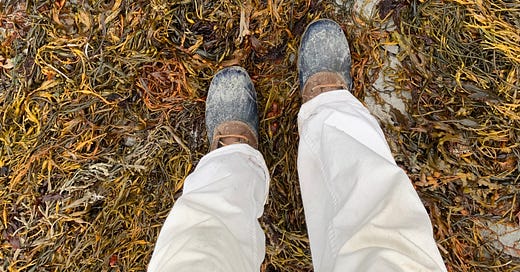Hi, hitting like button is a great and free way to support these Offerings. <3
I’ve been looking for an opportunity to use my new favorite word, which is inchoate. People who read outside academic spaces often have familiarity with words, but no idea how to pronounce them because we don’t hear them said. Until this past Friday, inchoate was that kind of word for me.
I’ve done so much reading on grief this past year and the word inchoate’s come up a lot. Not only did I not know how to pronounce it, I also had no idea what it meant. So when I came across it again this past week, I looked it up finally and am so glad I did! What a great word to know in transition.
Defined by Merriam-Webster as “being only partly in existence of operation,” and “imperfectly formed or formulated,” inchoate is listed as synonymous with incipient and incoherent. Inchoate’s a grief word to me, but more specifically seems like a word about what one is doing when mourning. It derives from the Latin inchoare “which means ‘to start work on’…but translates literally as ‘to hitch up.’"
Combining the prefix in- with the noun cohum, inchoare actually refers “to the strap that secures a plow beam to a draft animal’s yoke…this initial step toward the larger task of plowing a field explains how inchoate came to describe something (such as a plan or idea) in its early, not fully formed, stages of development.1”
Over the summer, I confessed that I rarely finish books but committed to changing. I then picked maybe the most challenging book I’ve ever read—Catherine Keller’s Face of the Deep—as my first to finish, no matter what happened.
It took me all summer. I didn’t like how incompetent I often felt while reading it, so I spent a good deal of time just avoiding. It was an experience and an at-times chaotic and mind-unraveling read, and I have to say that even now after several months my understanding of what it’s about is inchoate.
But what I do understand is that making a choice I know I’ll stick with will have repercussions. So I spent several days trying to decide which of the books in my winter stack are up next.
After some deliberation I picked philosopher and grief researcher Matthew Ratcliffe’s Grief Worlds which, despite the fact that I’ve never read it cover-to-cover, has been a hugely significant book for me. It was both my introduction and entry into the wild world known as philosophy of emotion.




